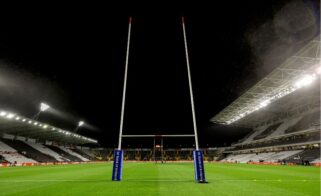Nice PR, Shame About The Rugby
27th June 2005 By Munster Rugby

Writing in The Guardian newspaper today, Richard Williams suggests that the circumstances that led to the Brian O’Driscoll injury are being used to deflect criticism
Writing in The Guardian newspaper today, Richard Williams suggests that the circumstances that led to the Brian O’Driscoll injury are an attempt to deflect attention from the lamentable performance of the British and Irish team.
As Woodward assesses his diminishing options in the light of Saturday’s horrifically maladroit performance in the first Test against the All Blacks, tomorrow’s game against Manawatu in Palmerston North has suddenly become critical to the tour’s future.
With the injured Brian O’Driscoll, Richard Hill and Tom Shanklin and the suspended Danny Grewcock following Lawrence Dallaglio, Malcolm O’Kelly and Simon Taylor out of the reckoning, a midweek fixture that had been little more than a formality now represents his only chance to re-examine the material from which he must rebuild his side.
“Undoubtedly players playing and benching in that game on Tuesday will be playing and benching in the Test match on Saturday,” he said. “So that becomes a very important game.”
For the tour party, he observed, without much fear of contradiction, Saturday represented “a bad day in more ways than one”. And that was before he heard yesterday that Grewcock had been found guilty of biting an All Black finger and suspended for two months. There was no suggestion of a protest from the touring party, Woodward having made it clear that he would accept the verdict of the judicial officer.
The O’Driscoll affair was a different matter. Several times over the weekend, in what appeared to be an attempt to deflect attention from the lamentable performance of the British and Irish team, the full weaponry of Woodward’s public relations team, run by Alastair Campbell, was brought to bear on the incident in which the captain dislocated his shoulder.
When the PR department is working with significantly greater efficiency than the lineout jumpers, something in the Lions party must be seriously off balance. However justified Woodward’s anger at the way O’Driscoll was taken out of the tour in the opening minute of Saturday’s match, his midnight visit to the media hotel in Christchurch to announce his intention of drawing the activities of Tana Umaga and Keven Mealamu to the attention of disciplinary authorities seemed unduly theatrical and calculated with an eye to headlines in Sunday papers.
While Woodward was describing the double spear-tackle which severely dislocated the unfortunate O’Driscoll’s shoulder, Campbell stood to one side observing the throng around the coach and instructing his assistants to keep members of the public at bay.
Those people were Lions fans who had spent thousands of pounds to follow the squad to New Zealand. And while no one books flights and hotel rooms for such a trip believing they have purchased a guarantee of success, many of them were keen to assert their belief that Saturday’s failure stemmed from Woodward’s broken promise.
He had taken the job, they reminded passing journalists, pledging to pick players on the basis of form rather than reputation. When he announced his team for the match in Christchurch, however, they could see that he had always been intent on building the line-up around key members of his England team of 2003.
On Saturday their fears of the potential consequences of such a decision became reality as, one after another, England’s world champions proved that they were not up to the task of recreating former glories.
Whatever the advice emanating from Campbell, who appears intent on providing his temporary boss with the equivalent of the White House’s rapid rebuttal unit, a prolongation of the ugly epilogue to Saturday’s match can only work against the Lions’ interests.
Woodward often talks about “moving on” but nothing will be achieved over the remaining fortnight of the tour unless he confronts the fundamental cause of the 21-3 defeat.
Jason Robinson, Ben Kay, Neil Back, Will Greenwood and even, until his early departure, Hill all failed to live up to their reputations on a filthy evening in Christchurch, for a variety of reasons including the inevitable effects of ageing and a known lack of current form.
The enthusiastic Martin Corry was less than influential and the perennially ill-disciplined Grewcock was subsequently found to have disgraced himself yet again. Josh Lewsey, so outstanding at full-back in the tour’s early matches, was wasted out on the wing. Jonny Wilkinson, playing out of position at inside centre, had a mixed night with his boot and made a couple of important tackles while missing others.
O’Driscoll’s injury apart, the bad sight of the night came as Sitiveni Sivivatu scored the All Blacks’ second try, after a magnificent handling move involving Justin Marshall, Daniel Carter, Aaron Mauger and Umaga, who broke the defensive line before flinging a long pass out to the left wing. Sivivatu’s inspired sprint left Lewsey and Wilkinson lying on the ground in his wake, while Robinson could only cling vainly on to the winger’s ankles as he touched down.
In terms of traumatic humiliation it was on a par with the afternoon in Cape Town 10 years ago when Jonah Lomu ran over half the England team on his way to the opening try of a World Cup semi-final.
Yesterday Woodward held two more press conferences, at which the question of the citing officer’s refusal to bring Umaga and Mealamu to the attention of the judicial officer again received the majority of the attention. For the second meeting a large screen was erected on which the O’Driscoll tackle was shown in slow motion over and over again.
In a conference lasting half an hour just over 20 minutes were devoted to the replays and a discussion of the disciplinary procedures, four or five minutes to introducing Gareth Thomas as the new captain and only a couple of minutes to the matter of how the head coach proposes to get the team playing decent rugby.
JPR Williams, hurrying in disgust on Saturday night out of a stadium that once served as a stage for his indomitable spirit, was not alone in failing to understand how such a huge financial and technical investment had produced a team so manifestly incapable of putting its game plan into operation. Assuming, of course, that there was such a plan, since not a shred of it was visible to the naked eye.
Whatever it was, Woodward will have to find something else now. “In hindsight I may have made a couple of mistakes,” he said last night, “and I hope to rectify them at the weekend.”
In Saturday’s aftermath he had been even more specific: “Next weekend we’ve got to make sure we, or rather I, get it right. Clearly I got it wrong tonight.”
His critics, for whom this is now open season, would suggest that the process of “getting it right” should not be confined to correcting the mistakes at the lineout. It should mean changing the playing philosophy from the rigid, territorial one that is generally, and not always fairly, associated with England to that represented by the freedom and spontaneity shown by the Welsh during their Grand Slam success last season.
What the Lions lacked on Saturday was a player willing to demonstrate that the New Zealanders are not the only ones capable of thinking on their feet and taking risks in order to dominate their opponents.
Woodward’s misguided reliance on the past created the crabbed, cautious, incompetent performance that brought about a potentially disastrous defeat. Only those with current form deserve a place in next Saturday’s line-up in Wellington, which means he will have to be prepared to make changes in addition to those imposed by unavailability.
By picking those whom he has so publicly rejected – Henson, Shane Williams, Geordan Murphy and Martyn Williams – he would be showing that he is prepared to make an explicit admission of fundamental error.
If he needs encouragement, he should go back to the videotape of the first Test and examine the contribution of the young Ryan Jones, who came on in the place of Hill to demonstrate that at least one Lion could play with the sort of dynamism and optimism that distinguished the All Blacks’ game.
To ignore the chance to make amends would be to risk sacrificing not just the tour but the ambitions of a group of talented young players for the sake of his own discredited convictions.
Humble pie is not a dish regularly to be found on the menu chez Woodward but there will never be a better time than now for a change of diet.



